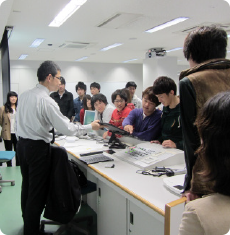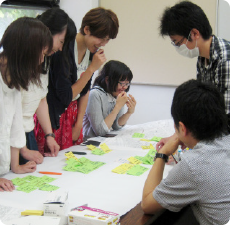Education
Undergraduate


In years 1–3, the work is divided between lectures, tutorials, classes, and practicals. The work in year one is located at the Toyonaka Campus, The University of Osaka. You will gain the knowledge and skills necessary for university learning. The work in years 2–3 will be located at the Suita Campus. Year two is designed to give you a comprehensive understanding of sustainable energy and environmental engineering. The work in year three is more specialized and students can choose subjects based on his/her career plan. Subject information in our division can be found at the bottom of this page.
The fourth year is entirely devoted to research comprising a full-time research project under the supervision of an academic staff member. Most of our research projects are conducted through a collaboration of academic staff, graduate students, and our industrial partners. Your research project will teach you how to approach challenging complex problems, design experiments and models, manage your time and resources, collaborate with others, present your work, and write reports and academic papers.
Graduate: Master’s program
The master’s program is a two-year course with lectures and research. You must obtain a minimum of 30 credits and receive a successful evaluation of your master’s thesis to be awarded this degree.
You will join one of our 20 laboratories (please see our research page) that covers a wide variety of topics related to sustainable energy and environmental engineering. The laboratory staff guide your research through face to face meetings and periodic seminars in which you will present your research progress. Most of our master’s students publish at least one research paper in an academic journal or proceedings of domestic and international conferences for experts during the two-year period.
Graduate: Ph.D. program
Ph.D. candidates are entirely devoted to research under the supervision of an academic staff member. For those who desire to enroll for the Ph.D. program, please visit our website that lists our laboratories and contact the academic staff who you would want as your supervisor. Please do this prior to the entrance examination.
Environmental Engineering Course
The Environmental Engineering Course deals with approaches to solving environmental issues both in Japan and throughout the world, from the micro- to macro-scale level. Through understanding basic environmental issues and analyzing how to solve a problem independently, this course enhances the student’s ability to solve various environmental issues. The pillars of this course are environmental science (science related to nature, Earth, and ecology), environmental systems (policy, environmental risk management, and energy management as global warming countermeasures), environmental design (urban/city planning and smart cities), and environmental materials (environmentally friendly manufacturing). The course is aimed at developing individuals with the diverse knowledge and expertise needed to become future leaders in international organizations, governmental organizations, or perhaps the manufacturing industry.
Nuclear Science and Energy Engineering Course
Energy takes form in terms of light, electricity, chemicals, machine, nuclear energy, and heat, and to understand, manufacture, convert, and apply it, it is important to have a broad knowledge of areas such as physics and chemistry. The Nuclear Science and Energy Engineering Course encompasses the basic sciences, which provide the foundation for studying the methodologies for working on various energy-related research topics. The pillars of this course are quantum energy (nuclear fission and nuclear fusion), nuclear power technology (front-end and back-end), laser beam engineering (medical applications and radiation usage), and material science (energy conversion materials, biomaterials). The course aims to create individuals with strong basic knowledge and strong expertise who could become actively involved in research institutes or the manufacturing industry.